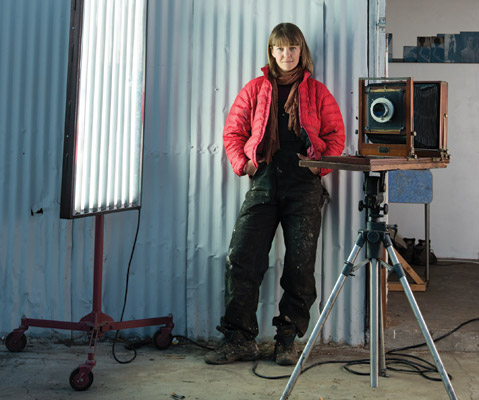The Alchemistress
Director Andrew Schoneberger

This study of Funk Zone-based artist Lindsey Ross and her fascination with wet plate collodion photography makes us ponder what it means to make original, one-of-a-kind art in an increasingly digitzed, reproduceable world.
When did you realize this would make a good doc?
I met Lindsey a about two years ago through some mutual friends. I think I realized she would make a good subject pretty early on, she’s just such a character. She’s really committed to her art, but also really approachable and friendly. I like the fact that as an artist, she’s relatively new to the wet plate process. She seems like she is getting better all the time, even though she has already produced some amazing work in her career.
What does she typically use as a subject?
I think if you look through her portfolio, portraiture is the majority of the work. As a photographer that likes to do portrait work, I think that was a draw for me as well. I love seeing how other photographers interact with a subject while making their portrait.
Living in a digital era when everything is mass produced, the film shows off truly one-of-a-kind photography. Does the art buying public appreciate this yet? Is there any resurgence in this sort of photography?
I think in the fine art world, this medium has always had some interest. For example, Chuck Close has worked in wet plate for along time. If you look around, I think you find a good amount of people seem to be working in wet plate collodion process so it seems like there has been a little but of a resurgence. Ian Ruhter comes to mind. He’s had some good press about the wet plate photos he’s making with his camera truck, and some of his short films (Silver & Light) have gotten a ton of attention on the internet.
There is also no editing allowed, no touching up in Photoshop. You are a photographer yourself. Is that a scary proposition, or are you always trying to capture the perfect shot while in the field?
When I’m shooting with digital, my goal is always to get it right “in camera.” I try not to ever think to myself, “I’ll just fix that later in Photoshop.” But I rarely, if ever, deliver images to a client that have not been post-processed in the computer. The thing that really impresses me about what Lindsey does is that she seems to get really great crops a lot of time, which is really tough to do no matter what format you’re working in. The view cameras and plates she’s working with have a fixed size and aspect ratio, she’s always working within those constraints, recomposing with her camera is not easy and I think that’s what struck me most when I was watching her shoot.
Has the digital era led to better or worse photography? How about better or worse photographers?
I think you can learn fast in the digital era. The feedback is instant and you don’t have to play for film and processing. So as long as you have a camera and enough memory on you’re computer you can really progress quickly at relatively very little cost. But, I think for the same reasons, photographers can get away with not learning some fundamentals. They know how to shoot with their camera, but if you hand then a different camera they’d be lost. There’s no consequences for making mistakes; you can usually fix them right away. I didn’t study photography formally in school but have done my best to create a strong base of fundamentals. Lately I find myself gravitating toward image styles and techniques that force me think more, slow down, and take more time before I make an image. I think cameras today are allowing people to make images they never could before, and I think the overall quality of the images we all see every day has risen, but I don’t know that means that photographers as a whole are better or more skilled.
Check the latest schedule here.



